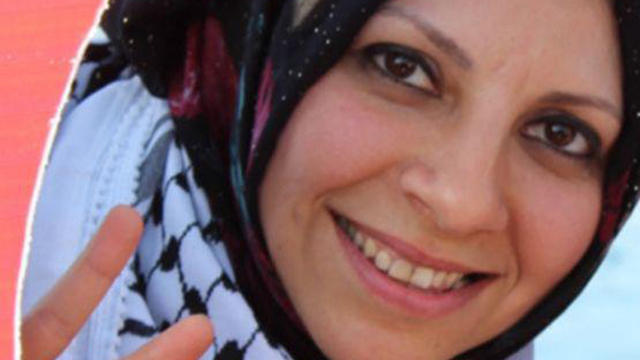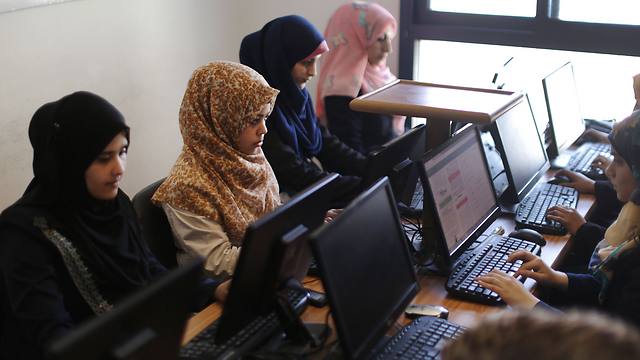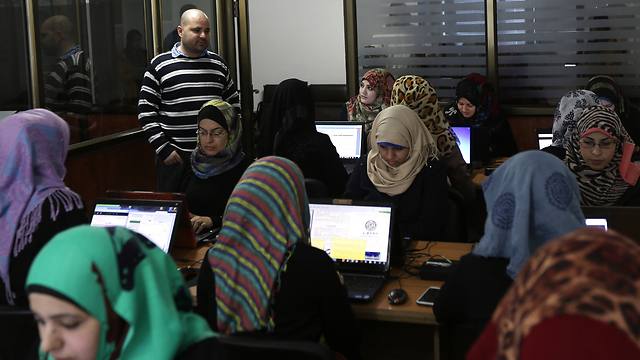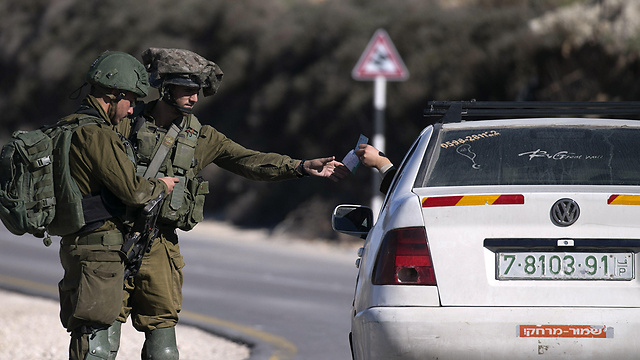
Female unemployment in Gaza skyrockets, 66% without jobs
While number of qualified, educated women in Gaza Strip has grown considerably, security realities make chances for finding work slim; unemployment has dire effects, leading to depression, drug abuse, suicide; Israel must recognize legitimate needs of women, allow them greater freedom of movement, says report for International Women's Day.
Conditions in Gaza are difficult, putting aside the argument of whether a humanitarian crisis exists in the strip or not. Inarguably, after more than a decade of blockade, limitation on movement and Palestinian Authority sanctions, the job market is dwindling—and nowhere is it more apparent than among women.
The latest available data, from 2016, show that in excess of 70 percent of the population was in need of humanitarian assistance, while 47 percent suffered from food insecurity. Unemployment rates have also skyrocketed in the past decade, and today stand at 35 percent among men and 66 percent among women.
Simultaneously with the marked, consistent downturn in available jobs in the strip, a dramatic increase of more than 200 percent took place in the number of job-seeking women.
As the scant number of available jobs is usually offered to men, and since Israel no longer allows Gaza laborer to work in Israel, Gazan men turn to Gaza for employment, which limits the number of jobs available to women even more drastically.
Maryam Abu al-Ata of Gaza is a project director for the Aisha Association for Woman and Child Protection. "The unemployment rate among young people, men and women alike, is very high, but even those counted as employed face many hardships," she said.
"Most work contracts have durations of between a month and five months, so workers never enjoy job security. Even those who can find jobs almost never receive social benefits. In addition, many times payment is received many months after the work was carried out," she added.
The current situation, in which educated women are entering the job market in droves, while the number of available jobs only dwindles, is especially problematic considering the fact that many women now find themselves exclusive breadwinners in their families.
As a related trend, many women seek employment in fields previously considered "masculine," such as banking, investments and management.
Changes in Israeli policy regarding Gaza trade focused on goods, such as expanding the varieties of agricultural products allowed to be marketed. No such change, however, was made regarding the movement of people from Gaza.
The new policy therefore skipped much of the job market and prevented many—most of them women—from obtaining professional training and development available outside of Gaza.
While Israel approves the exit of women from Gaza to professional training in the West Bank on occasion, it marks a drop in the ocean in relation to the number of women in need of such training.
The Gaza reality, as part of which access to the outside world is possible only through Israel—and the Erez Crossing—or Egypt—and the Rafah Crossing, which is closed almost all year round—makes it nearly impossible for women to break glass ceilings.
"Overseas job opportunities for women from the strip are rare. Israeli policy at crossings and security directives make it very difficult," Abu al-Ata said. "It's come to not even considering applying for permits for job opportunities abroad, because we know they'll be turned down."

She added, "The year I graduated from university was the year elections in the Palestinian Authority were held, immediately followed by the Gaza coup. Then a far-reaching Israeli operation took place and it was nearly impossible to find work.
"After years of trying unsuccessfully to find a long-term job in architecture, I considered immigrating to another country. I managed to land a job in the United Arab Emirates, but after much deliberation decided not to take it.
"I wanted to stay in Gaza and contribute to my society and community. It was a very significant decision. I was still looking for a job in architecture years later, but I've been unsuccessful."
Al-Ata attests that she had big dreams and aspirations when she was just starting out her academic career, but they were quickly shattered by reality. "After graduation and coming to realize I had few employment opportunities, my mental state deteriorated. I could barely find it in me to leave home.
"I realized my diploma will not help me get a job. A lot of engineering companies went out of business in Gaza in the past few years, while infrastructures keep breaking apart.
"As a woman, job hunting in Gaza is very hard. You're up against an immense shortage in jobs and a discriminatory preference of men, considered the primary breadwinners for their families, to begin with."
'Limitations on movement prevent a respectable life'
According to the Aisha project director, the immense hardship so prevalent in Gaza has led to tragic results among academics who can't find a job on graduation. Abu al-Ata also shined a light on a topic considered taboo in Palestinian society.
"The dire economic fortunes has pushed university graduates to drugs, violence, depression and even suicide. They lose hope and feel like there's no point to go on living. The mental duress and trauma life in the strip confronts them with are doubly hard on women," she explained.
The Gisha – Legal Center for Freedom of Movement NGO, which works to defend Gaza Palestinians' freedom of movement, will publish a report Thursday for International Women's Day analyzing the blockade's influence on local women's life.
Gisha noted that women are an integral part of any healthy, thriving workforce and have immense potential to contribute to the promotion and development of Gaza's economy.
"Limitations on movement breach women's fundamental rights to freedom of movement, break apart families, delay economic development and prevent a respectable life to all citizens of the strip, men and women alike," the report said.
"Israel must recognize the legitimate needs of business and professional women in the strip, and allow them to go abroad, as well as move between Palestinian territories (subject to specific security checks)."














